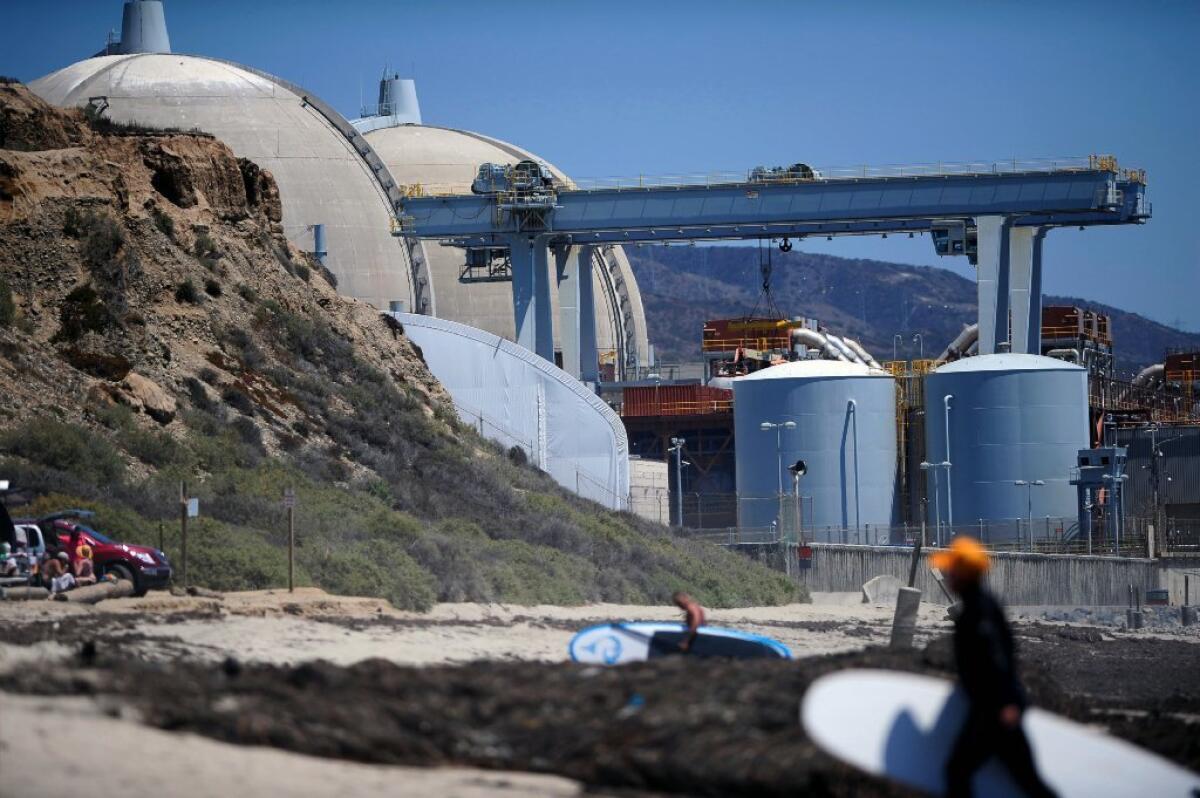Advocates seek to kill deal that sticks ratepayers with San Onofre costs

The San Onofre nuclear power plant, shown in 2012, will not be restarted, Edison officials say.
- Share via
Reporting from Sacramento — Consumer advocates, outraged by a secret negotiation in Poland over the $5-billion cost of closing the San Onofre nuclear power plant, are asking the California Public Utilities Commission to reconsider a deal that sticks utility customers with the bulk of the bill.
The groups demanded Friday that Southern California Edison Co. return at least $650 million to customers. The financial penalty, they said, should be a punishment for holding backroom talks with former PUC President Michael Peevey during a 2013 energy conference in Warsaw.
Southern California Edison defended the current settlement, calling it “fair and reasonable.” The PUC had no comment.
In separate statements, the Utility Reform Network, known as TURN, and the PUC’s Office of Ratepayer Advocates said they were shocked that Peevey and Edison Vice President Steven Pickett outlined a rough agreement a year before a proposed legal settlement was announced.
“The Warsaw meeting was a flagrant violation of CPUC rules,” said Matt Freedman, a lawyer for San Francisco-based TURN.
Friday’s action came as the San Onofre nuclear plant, shut down in 2013, and majority owner Edison are playing a bigger role in the unfolding scandal at the PUC. Until recently, most attention was directed at ties between Peevey and the state’s largest utility, Pacific Gas & Electric Co. of San Francisco.
Many details of PG&E’s ties emerged in emails with PUC officials that the company made public in recent months.
Now the PUC wants Southern California Edison to make a similar release of correspondence.
Most of the Southern California controversy centers on the San Onofre plant, which was permanently closed 18 months after new steam generating equipment leaked a small amount of radioactivity.
In March 2014, the PUC, Edison and other parties announced a proposed settlement spelling out who would pay how much of the cost of closing the plant.
Since then, Edison revealed that one of its executives met in Warsaw with Peevey, who is under investigation by state and federal officials. Peevey has denied any wrongdoing, but has been unavailable to comment in recent months.
The Bristol Hotel hand written notes were among items seized in investigators when they searched Peevey’s La Cañada Flintridge home in January.
Both the secret plan and a somewhat more consumer-friendly final plan, unanimously approved by the PUC in November, roughly required utility customers to pay $3.3 billion. Edison and its shareholders would be on the hook for $1.4billion.
The recently released meeting notes broke rules governing illegal contacts between utility executives and their regulator, Freedman said. He noted that he only learned of the Warsaw deal during a private meeting with Peevey on April 10, 2014.
The San Onofre plant’s new steam generating equipment was turned off in January 2012. Two units built in the early 1980s were permanently deactivated in June 2013 because Edison couldn’t fix the defective generators at a cost of $770 million.
Joseph Como, acting director of the Office of Ratepayer Advocates, wants Edison and its junior partner in the San Onofre plant, San Diego Gas & Electric Co., to return at least $648 million to customers.
Ratepayers might be even better served if they got back more than $1 billion, Como added. The final figure, he said, would depend on the outcome of a PUC investigation.
“We need to see how basically deep the rathole goes,” he said.
Both the California attorney general’s office and the U.S. Justice Department are conducting broad probes into activities of the state’s investor-owned, for-profit utilities and their relations with top PUC officials. According to the search warrant, they are looking for evidence of illegal communications, bribery, obstruction of justice and other crimes.
Michael Aguirre, a San Diego consumer attorney, said already released documents provide more than enough proof that the San Onofre settlement was illegal and should be tossed out. He wants the two utilities to pay for most of the nuclear plant’s shutdown.
What’s more, Aguirre contends, rival consumer group TURN should be disqualified from legal proceedings because it didn’t notify the PUC judge that Peevey told them about the Warsaw plan.
TURN’s Freeman said the PUC’s rules outlawed what Aguirre wanted.
“At the time of our meeting with Mr. Peevey, TURN had no other evidence of the Warsaw meeting,” he said, or proof that it occurred.
Twitter:@MarcLifsher
More to Read
Inside the business of entertainment
The Wide Shot brings you news, analysis and insights on everything from streaming wars to production — and what it all means for the future.
You may occasionally receive promotional content from the Los Angeles Times.










